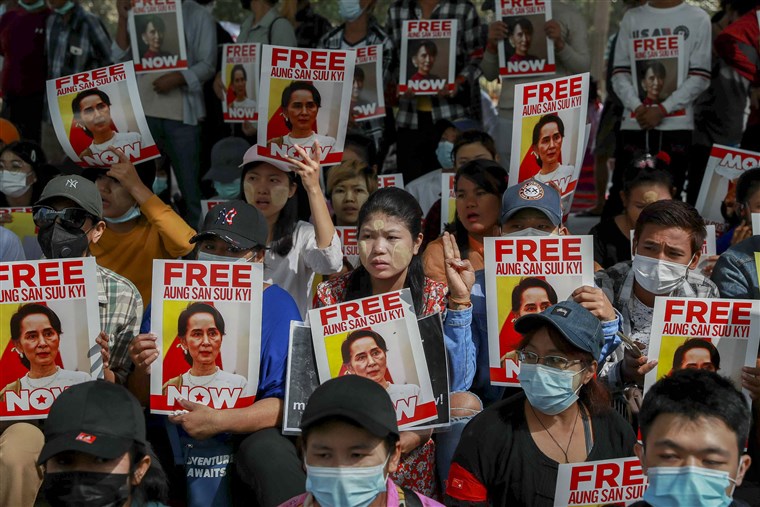In diplomacy and politics, it is said there are no friends or enemies, and instead there are only “interests”. Developments around the world in the wake of the atrocious February 1 military coup in Myanmar, and the ongoing street struggle of the Myanmar people against this monstrous injustice done to them, should remind everyone, but in particular the beleaguered people of Myanmar, of this reality. Diplomacy and politics are indeed proving to be amoral, and nations around the world are now taking their time to consider where their “interests” lie first and foremost before they decide to respond to the Myanmar people’s anguished call for help. If any nation thinks its “interest” is served by aligning with either the NLD or the Junta, let nobody have any doubt that nation will not hesitate to go that way. It must be said China has been blatantly open about this and that they have made it clear in so many different gestures and shows of intent that they would partner with anybody who forms a stable government in Myanmar, but let there again be no doing, all other nations, however discreet they may be on the subject, will also like China ultimately look after their “interests” first and express them in ways that suit their own temperaments.
The much-anticipated virtual meet on March 12, of the Quadrilateral Security Dialogue, QUAD, turned out to be remarkable in this regard. It is true the QUAD meet did not have Myanmar on the priority list of its agenda, and as speculated, its urgency was the manner a new direction has been shaping up in geopolitics in the present time, sometimes describe as a new cold war between the four QUAD allies – namely India, Australia, Japan and USA, on one side – and China on the other. The QUAD ostensibly came into existence, as we remember, in response to the emergent humanitarian crisis in the immediate wake of the tsunami in the Indian ocean in 2004, devastating much of the Indian Ocean rimlands, but it was given life formally in 2017, when the then Trump administration began launching its broadside on China and looked for means to contain the country before it grew from a competitor to a formidable adversary. Indeed, QUAD had by then clearly transformed into a grouping meant as a counter to what was perceived as a push by China to establish its influence and hegemony, both economic and military, in the South East Asian region. The March 12 meet ended all doubts that the new Biden administration in the US would overturn this direction of US foreign policy initiated by his predecessor and hence the China containment policy does not seem just about to be softened. Although the stated agenda of the recent meet was to forge a joint front in the fight against COVID, climate change and regional cooperation without explicitly mentioning the China threat anywhere, nobody should have any doubt the latter concern was the dominant mood. Much has already been said about the meet, and also on how far its objective of weaning ASEAN countries away from China can be successful, given that China has become the foremost trading partner of almost all of these countries. Not only these ASEAN countries, but China also now ranks as either number one or two trading partner of the very countries in the QUAD themselves. This being so, whether the meet will mark the start of a new cold war remains to be seen.
The QUAD meet was however also conspicuous by some of its silences. The most glaring, and indeed depressing of these is its reluctance to come out with any strong statement on the developments in Myanmar, where the country’s military has on February 1, overturned a landslide election result in favour of the National League for Democracy, NLD, led by charismatic leader, Aung San Suu Kyi, to declare a year-long national emergency citing Article 417 of the country’s 2008 drafted constitution. Citing further Article 418(a), the country’s legislative as well as executive powers were handed over the Commander-in-Chief of the national army, or Tatmadaw. The QUAD meet merely sent out a tame and ambiguous appeal for the trouble in Myanmar to be resolved soon so that some semblance of normalcy can be restored. On India’s part, the advice by many senior former diplomats and Myanmar experts in the run up to the QUAD meet was in the nature of a caution against taking any hasty decisions determined by emotions, and to act “pragmatic”. As anticipated by many right from the start of Myanmar’s current trouble, including by this writer, quite obviously QUAD’s diplomatic “interest”, and those of individual nations in it, is more to do with China and not Myanmar. This may indeed be “pragmatic”, but the amorality and coldness of the entire approach is frightening, especially when the turmoil in Myanmar, and the suffering the Myanmar people are going through right now, is before the world’s eyes, thanks to the internet enabled smartphones and the exponential explosion of the number of citizen journalists, many of whom have been courageously taking pictures and video recordings of all developments on the streets of the country’s cities and townships, to upload for the rest of the world to see.
At this moment, although no formal statements have come out yet, India does seem ready to make truce with the Tatmadaw if need be. The indications are not even subtle anymore. Even as reports emerged that Myanmar nationals, including some police officers, decided enough was enough and walked across the border into Mizoram to seek refuge as political exiles and that the Mizoram government accorded them warm welcome, the Union Home Minister, Amit Shah, came out with a directive to four Northeastern states of Arunachal Pradesh, Nagaland, Manipur and Mizoram, that no Myanmar refuge seekers should be allowed to cross into India. This was followed by the silence on the Myanmar development at the QUAD meet, and this silence is even more meaningful considering India, unlike the other three QUAD partners, is the only one which is an immediate neighbour of Myanmar.
India’s cautious approach is also probably a consequence of a past miscalculation and disastrous past Myanmar policy that followed. During the pro-democracy struggle against Myanmar’s previous military rule, led again by Aung San Suu Kyi for which she was imprisoned for an extended 15 years (1989 to 2010), India joined the Western world to boycott of the military Junta in the initial years, and it was only when it had become evident that the Junta was unlikely to be replaced that India began to change stance. By then however it was too late, for while the developed world boycotted Myanmar, China took the “pragmatic” path and embraced the country, not so much because it love the Junta, but because Myanmar was vital on its geo-strategic map. Among others, a friendly Myanmar would give China a land corridor to the Indian Ocean, which would give it sea access to the Arabian peninsula and Africa, two of its biggest resource bases. Myanmar’s importance to China is summed up thus by well-known historian and author from the country, Thant Myint U in a recent article in London Review of Books: “There are more than a million ethnic Chinese in Burma, and Chinese oil and gas pipelines run across the country. An attack on either would be a nightmare for Beijing. The second (need) is to prevent Burma from becoming a base for rivals such as the US or India. The third is to turn Burma into a corridor to the Indian Ocean. China wants strategic dominance but appreciates the strength of Burmese nationalist feeling. And it holds levers that no other foreign power can match.”
Quite obviously, China would be ready to befriend any stable government in Myanmar, military or civil. Good or bad, its needs in this theatre are more materially grounded than determined by abstract affiliation to ideology or morality. Probably, the “pragmatic” approach publicly recommended for India by many strategic thinkers in India, including former Myanmar ambassador Rajiv Bhatia in his recent newspaper articles, is also a version of the Chinese approach. In any case, as with China, at this juncture, given the developments on the civil rights front, India too has little justification left to eulogise democracy and democratic values. The slow smothering of free speech, the latest evidence of which is the resignation of professors of the reputed Ashoka University and known critics of the present government, all show the direction Indian democracy is headed. The signs of a willingness to adopt an amoral diplomacy with regards to Myanmar hence can be seen as an inevitable consequence. In the end, Myanmar must prepare for this grave reality of geopolitics. They must realise they have only themselves to fight their own demons and not expect others to do the exorcism for them or even extend any overt assistance in their struggle.












